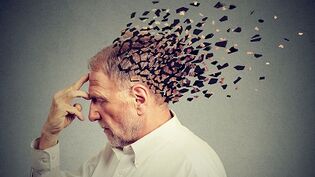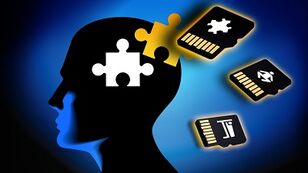
There are completely opposite views on drugs to improve memory. Some say it is helpful and helps to cope with increased intellectual stress, that it really helps and effectively.
Others say it's just a myth that taking such drugs is of no use, that it can even be harmful and addictive to the drug. Let's try to consider both views in more detail and figure out who is right.
A little about memory
Memory is a mental function of higher nervous activity that helps to accumulate, store, and reproduce previously received information. Memory allows long-term storage of information about the outside world or the body's reactions to any influence, as well as allows this information to be used for the proper organization of future activities.
Memory contains a number of different but related processes.
- Memorization- entering new data, sensations.
- Storage- storage of data, sensations includes their processing and assimilation. This process allows a person to learn, develops his thinking and speech.
- Reproduction and recognition- actualization of past elements, actions, feelings. Reproduction is forced (elements of a person's mind "floats" without his will and effort) and arbitrary.
- Forgetting- the ability to lose the ability to reproduce and recognize previously memorized elements. It can be temporary or permanent. Incomplete forgetfulness occurs when information is reproduced or recognized in error or in part.
Basic memory types
There are many types and subtypes of memory classification. Let's talk about its main types.
- Sensory memory- storing information from the senses after stimulation.
- Tactile memory- storing information from receptors as a result of touch.
- Engine Memory- When storing motion information, many may remember that there are motions that they make automatically.
- Semantic Memory- Storing factual information such as learned stories, dates, multiplication tables.
- Short-term memory- Temporary storage of information. There is a small volume.
- Long-term memory- storage of information indefinitely, including for life.
Memory laws

Few people know that there are multiple laws of memory. It is not the author's invention, but scientifically proven and proven real life models.
- Repetition Law- Information is remembered much better if it is repeated several times.
- Law of Interest- If a person is interested in information, he will remember it faster and better.
- Edge Law- The information provided at the beginning and end is best remembered.
- Law of Understanding- If the information is deeply understood, it will be better remembered.
- Optimal queue length rule- The amount of memorized information should not exceed the amount of short-term memory.
- Installation Law- A person who has given himself an installation that needs to remember this or that information will remember it faster and better.
- Prevention Law- Remembering similar concepts, the old information "overlaps" with the new.
- Contextual Law- Remembering things that can be related to already familiar concepts is faster.
- Law of Conduct- If memorized is used in practice, memorizing is more efficient and faster.
These rules can be used if you want to remember something faster and better, as well as train your memory.
Causes of memory loss
- Organic brain damage- acute cerebrovascular disorders, traumatic brain injury, brain tumor.
- Diseases of other organs and systems- Diseases of the liver, cardiovascular system.
- External factors- poor ecology, drastic changes in the conditions of existence, stress, sleep disorders.
- Age-related changes in brain structure- Decreased number of interneuronal connections.
- Chronic intoxication- smoking, drug use, drug use, alcoholism, drug use (sedatives, tranquilizers).
Treatment of memory disorders
If memory needs to be improved, the medicine will not be prescribed immediately. First, they try to apply non-drug methods. These include:
- A quick walk in the fresh air. It increases the access of oxygen to the brain. This improves the efficiency of his work.
- Normalize sleepand alertness.
- Evening training- the habit of remembering all the events of the day in reverse order, that is, first of all, remembering what happened in the evening, and finally - the events of the morning, can become an unusual workout. Better to do it before going to bed, sleeping in bed.
- Positive attitude, don't stick to it- don't think you have a bad memory, no one removed the effect of self-hypnosis. If at some point you can't remember something, don't worry, don't get angry, but just distract yourself, do something else, and then try to remember what you've forgotten again.
- Daily workouts- Solve crosswords, puzzles, scan words.
- Education- learn poetry, foreign languages, do it regularly, gradually increase the amount of material learned.
Memory Loss Drugs

It is clear that poetry, learning a foreign language, solving puzzles is not easy, it is necessary to "tension", walking and solving puzzles should be given extra time, which is practically no work person.
It's much easier to take a pill, calm down and hope for the magical power of medicine - your memory will improve immediately and you won't have to do anything! Today's city dweller is so lazy and spoiled by the fruits of civilization that now few people are so purposeful and willing to spend time and energy training memory. So a person is looking for an answer to their question - what memory enhancement pills are there?
So let's look at two opposing views on this issue:
Positive Opinion
Proponents of these drugs say a number of drugs help improve the blood supply to brain cells, improving their nutrition and delivering more oxygen, which improves neuronal metabolism.This is aided by nootropic drugs and drugs that improve the rheological properties of the blood.
Herbal preparations have become widespread, which not only improve neuronal metabolism, but also increase the effects of nootropic drugs.
But remember that any (absolutely any) drug has its own contraindications and side effects, so in each specific clinical case it should only be prescribed by a doctor.
Negative opinion
According to several experts, the coin also has a downside. Several years ago, experts were confused by the question - is this medicine effective, or is it just a placebo effect?
Many studies have not shown the effectiveness of nootropic drugs. There is no evidence that they have a positive effect on memory. One of the small studies of the medicine's effectiveness showed that it had little effect, but not in severe cases.
There are virtually no studies on traditional methods and herbal preparations such as ginseng, vitamin E. The evidence base is only for the use of herbal medicines in patients with dementia. But there are no data on efficacy in relatively healthy people.
In conclusion, I would like to say that when thinking about which medicines are best for improving memory, do not forget that they should be prescribed by a doctor. And the doctor should also evaluate the effectiveness in each case. Do not rely on the advice of friends, neighbors or relatives.
If you think your memory has deteriorated, see a neurologist. Maybe it's not a problem at all, attention may be distracted, there may be other problems. It is also necessary to find out the cause of this condition. And this can only be done by a qualified doctor.







































































